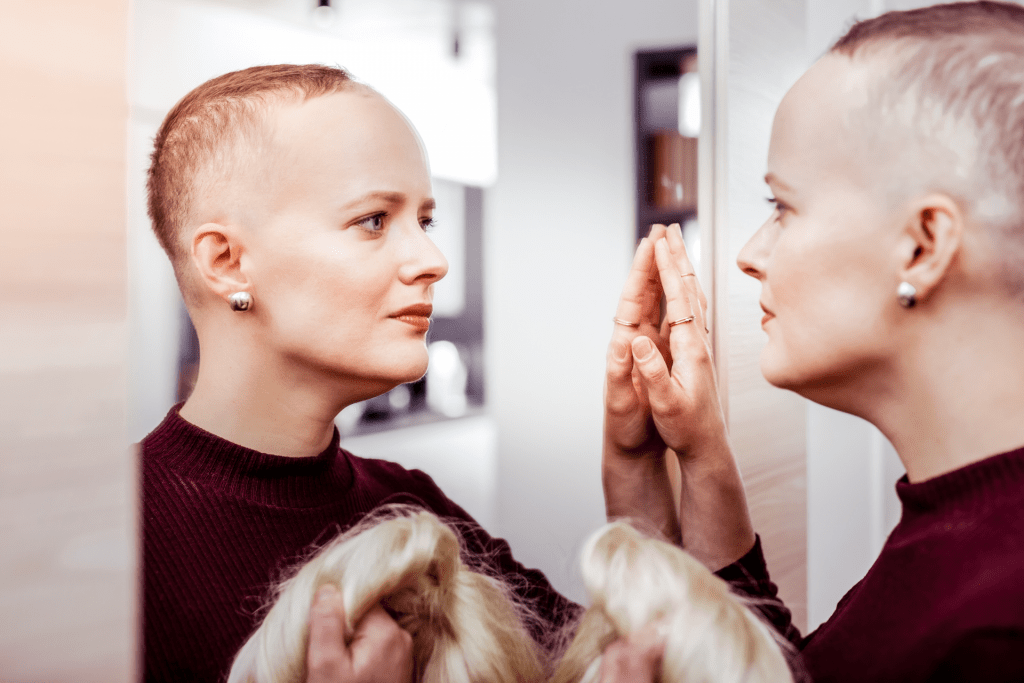Introduction
You don’t know the value of something until you’ve lost it! Hair loss is one of the most dreaded side-effects of chemotherapy in cancer patients. An instant image of a bald scalp is an immediate reaction in most upon receiving their diagnosis.
Treatment of cancer depends on the type of cancer. Some cancers respond best to surgery and radiation therapy while others respond better to chemotherapy. Radiotherapy and surgery are target driven therapies, whereas chemotherapy affects all the cells in the body. Chemotherapy has a number of side effects but hair loss is the most psychologically traumatic. Fortunately, in most cases, hair regrowth after chemotherapy will occur.
Why does chemotherapy cause hair loss?
Chemotherapy (or simply chemo) is one of the most effective ways to remove cancer cells that have spread in the body. While chemotherapy medications attack rapidly growing cancer cells, it can also attack fast-growing healthy cells like skin, hair, intestines and bone marrow. The lifecycle of hair is a dynamic process. The number of strands falling is generally replaced by new strands growing from the hair follicles. Chemotherapy drugs stop this high rate of growth in hair follicles resulting in gradual thinning and/or loss of hair.
Some people may lose hair only from the scalp while others experience hair loss from all over the body including eyebrows, eyelashes, armpits, and pubic areas. The extent of hair loss can vary widely depending on the type and dose of the drugs being used for chemotherapy. Some people may experience only thinning of hair instead of complete hair loss. Hair may fall out gradually for some people and in others it may occur very quickly, even in clumps. People may notice accumulations of loose hair on their pillow, in their sink or shower drain, or in a hairbrush. They may also feel tenderness of the scalp. Some people choose to shave their heads or wear wigs or hats so that they don’t have to watch it fall out. Many women prefer wearing scarves to cover their heads.
When do they grow back?
Hair regrowth after chemotherapy is a major concern for cancer patients. Luckily, there are only rare circumstances in which hair doesn’t grow back after the completion of chemotherapy. Many people report seeing hair growth while they are still undergoing chemotherapy; however, the time it takes to grow back a full head of hair varies from person to person.
It takes time for chemotherapy drugs to metabolize and exit the body, therefore the growth of hair follicles remains arrested after chemotherapy has been stopped.
“It takes around 3 to 6 months to regrow hair after the completion of chemotherapy cycles”
The hair regrowth process is slow and steady but hair loss due to chemotherapy is rarely permanent. Only a small number of people may never get their hair back. This is due to continuous, strong, and treatments of long duration with chemotherapy. There are specific anti-cancer drugs that cause permanent hair loss. Drugs that are used for breast cancer treatment such as Docetaxel, which is sold under the brand name Taxotere, have been known to cause permanent hair loss in some people. Though the condition is rare, hair follicles might get burned out and shut down resulting in no new hair growth.
Your new hair may be just like your old hair or it may be straighter or curlier. It could grow back thicker, or sometimes thinner, than your original hair. Your hair might also grow back with different colors after chemotherapy but may also go back to the same color after some time.
The following is a timeline of hair regrowth in some people after chemotherapy:
- After 2-3 weeks: Soft fuzzy hair forms.
- 1-2 months: Thicker and stronger hair begins growing.
- 2-3 months: Hair may cross the 1-inch milestone.
- 6+ months: Bald patches disappear. Hair growth gains its normal pace.
- >12 months: The hair is long enough to be combed or styled.
Boosting faster hair growth
Although hair cannot be forced to grow faster after chemotherapy, people are obviously anxious to have their hair back. The following “tips” can be followed to help speed up hair growth.
- Avoid anything that is part of your hair routine that can damage your hair ( i.e heat styling, brushing harshly, etc.). Breakage doesn’t promote hair growth.
- Multivitamins like biotin are extremely beneficial for promoting hair regrowth. Vitamins B, C (antioxidant), E, D, some proteins (keratin), amino acids (L-cysteine), zinc, and iron are some of the ingredients to look at when reading supplement labels.
- Stay hydrated. Drinking 8-10 glasses of water per day is a way to make your hair grow faster.
- Split ends do not facilitate hair growth so regular hair trimming is very important.
- Using hair oil is also very important to keep hair moisturized and healthy.
- Use gentle shampoo and conditioner.
- Avoid dyeing or coloring hair after chemotherapy because hair is still fragile and the scalp is sensitive.
Conclusion
Chemotherapy is a demanding treatment, both physically and emotionally, for cancer patients. The drug-induced hair loss that occurs as a side effect of chemotherapy is obviously unwelcomed by patients. Although there is no way to prevent this hair loss, the predicament is not always long-lasting. Upon completion of chemotherapy hair will begin to regrow within a few months.
References
- https://www.ncbi.nlm.nih.gov/pmc/articles/PMC6326423/
- https://www.thewaywardwayblog.com/make-your-hair-grow-faster-after-chemo/
- https://www.verywellhealth.com/hair-regrowth-after-chemotherapy-513924
- https://www.ncbi.nlm.nih.gov/pmc/articles/PMC5540831/
- https://www.ncbi.nlm.nih.gov/pmc/articles/PMC6133184/
- https://www.verywellhealth.com/hair-regrowth-after-chemotherapy-513924breastcancer.org/tips/hair_skin_nails/regrowth
- https://www.medicalnewstoday.com/articles/319446.php
- https://www.webmd.com/cancer/chemo-hair-loss
- https://www.ncbi.nlm.nih.gov/pmc/articles/PMC6475836/

